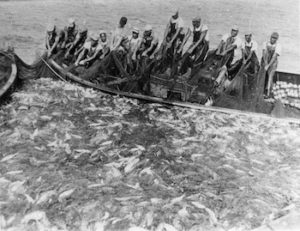
Hard work with song!
This date's Registry looks at the origins of the Chanteys in 1882. A Chantey is a Black folk choral singing style associated with Black slave labor in the early United States.
The Chantey has roots in some of the earliest African customs brought through the Middle Passage. These words, melodies, and meanings sustained black slave populations in the Antebellum South, the Central Caribbean, and South America. In Slave Songs of the Georgia Sea Islands, Blacks working on plantations sang work songs called “shanties or chanteys.” These areas were near passable rivers and were heard in Georgia as early as the 1880s. The Chanteys (singers) tended to die out as the work that demanded their services declined. Exactly when Chanteys were first used to help men lift nets in the Menhaden fishery is unknown.
The practice likely began when purse seine technology, developed in the northern states, came to be used in the southern states of Virginia and North and South Carolina, where Black African crews and labor were standard at the end of the 19th century. Chantey singing among menhaden fishermen, which became widespread around 1920, represents an adaptation of work songs by Blacks in various mainland occupations during the late 19th century--lumbering and mining and building roads, railroads, levees, and sailboats. The rhythm of this call-and-response singing was valuable in aiding the men's efficiency.
Back in the Day, a story was about a big sailboat where men had lined up, singing and hammering away. The big boss complained to the foreman about the men singing, and the foreman asked, "Do you want me to make them stop?" The boss said, "Yeah," and then they didn't know how to work! They sang chanteys, and that's what made the work go!
Blackwork songs in America go back to a West African tradition that combines the call-and-response form, the improvisational nature of the words, and the functional relation of the songs to the lives of the singers. The work song improved the workers' efficiency by bringing together the combined efforts of men laboring on a common task. It allowed them to do things they could not do with uncoordinated individual effort.
Since slavery, laborers have been documented as accomplishing more work if they were allowed to sing. Hence, overseers not only encouraged slaves to sing but often tolerated critical or satirical lyrics. Frederick Douglass wrote, "A silent slave is not liked by the masters.” Work songs allowed Black workers to gain a measure of control over their work—to turn it into a form of expression and to control the pace of the work itself.
From long rowboats, as many as 40 Chanteys “men” hauled in a "purse seine," a net filled with thousands of pounds of fish. They sang "chanteys" to coordinate their work movements to accomplish this backbreaking feat. These fisherman's work songs were heard on boats out of Virginia and North Carolina wherever they pursued the great migrating schools of Menhaden (forage fish) along the Atlantic coast, from New Jersey to the Gulf of Mexico. These traditions were repeated during WW II and the Alcan Highway construction in Canada by Black G.I. Today, the Northern Neck Chantey Singers carry on this tradition, performing for enthusiastic audiences.
Elerrito Free Folk Festival.org
South Street Seaport Museum.org
Maryland Sea Grant,
University System of Maryland
4321 Hartwick Road, Suite 300,
College Park, Maryland 20740
(301) 403-4220 V
(301) 403-4255 F